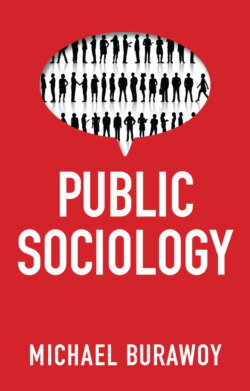Public Sociology

Реклама. ООО «ЛитРес», ИНН: 7719571260.
Оглавление
Michael Burawoy. Public Sociology
Table of Contents
List of Tables
Guide
Pages
Epigraph
Public Sociology. Between Utopia and Anti-Utopia
Copyright Page
Tables
Preface
Introduction The Promise of Sociology
Note
Part One Theory and Practice
1 Theory Utopia and Anti-Utopia
The Canon That Was
Reconstructing the Canon
2 Practice The (Di)vision of Sociological Labor
From Professional Sociology to Public Sociology
From Policy Sociology to Critical Sociology
Defining Four Sociologies
Competition in the National and Global Arenas
Sociology’s Standpoint: Civil Society
Part Two Policy Sociology
3 The Language Question in University Education
4 Job Evaluation in a Racial Order
Part Three Public Sociology
5 The Color of Class
6 Student Rebellion
Part Four Critical Sociology
7 Race, Class, and Colonialism
8 Migrant Labor and the State
Note
9 Manufacturing Consent
10 Racial Capitalism
Note
Part Five Professional Sociology
11 Advancing a Research Program
12 Painting Socialism
13 The Great Involution
Part Six Real Utopias
14 Third-Wave Marketization
Notes
15 Whither the Public University?
Unmaking the Public University
Fiscal Crisis
Governance Crisis
Identity Crisis
Legitimation Crisis
The Future
Note
16 Living Theory
Notes
Conclusion Biography Meets History
References
Index
POLITY END USER LICENSE AGREEMENT
Отрывок из книги
Man would not have attained the possible unless time and again he had reached out for the impossible.
—Max Weber
.....
Part Five describes my own trajectory into professional sociology. It opens with a series of flukes that landed me a position at Berkeley. This was as radical a department of sociology as you could find in the US, but it was still driven by the imperatives of the discipline. To survive I had to develop a research program – both a methodology and a theory – that could advance Marxism within professional sociology. What was at stake was not only the advance of a Marxist science, not only my own survival, but also securing jobs for my students. To establish some sort of legitimacy for Marxism I had to respond to mainstream critics of my research. Among other things, they were skeptical of the generality of my claims based on the study of a single factory. They doubted that my experiences in my Chicago factory were a function of capitalism rather than modern industrialism. I responded by developing the “extended case method” but also turning, once again, to working in factories, this time in socialist Hungary. There I identified their specifically socialist organization of labor, their specifically socialist production politics, and how they harbored a real utopia of democratic socialism. There were similarities between socialist and capitalist production, but there were also fundamental differences.
History took an unexpected turn. In 1989, while I was working away in the Lenin Steel Works (LKM), then the biggest and oldest steel mill in Hungary, state socialism crumbled. The democratic socialism I had envisioned from within the furnaces of LKM was never a serious contender; instead state socialism gave way to a destructive capitalism. That transition was not what I had come to Hungary to study. So I migrated to the still-standing high command of state socialism, to become a worker in the Soviet Union. But not for long. It was 1991 and the Soviet Union was itself in flux, about to sink into an extortionate merchant capitalism. From their lofty perch the Western economists were debating whether the transition to capitalism should be a revolutionary break with communism (shock therapy) or an evolutionary movement built through the creation of new supportive institutions. From where I was, in the factory, all I could see was the post-Soviet economy’s self-destructive involution. The realm of exchange was flourishing but it came at the cost of production – out of the planned economy arose barter, mafia, and banks eating away at industry and agriculture. A few were making enormous gains, while the vast majority sank into precarity. Utopian thinking – mine as well as theirs – was dashed, once again, on unseen rocks.
.....